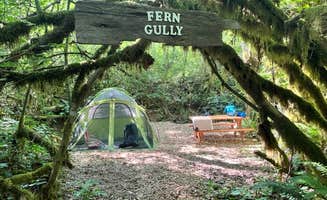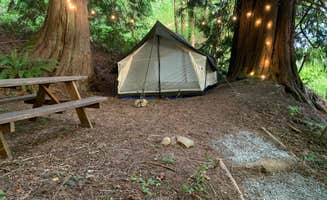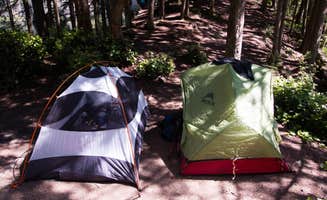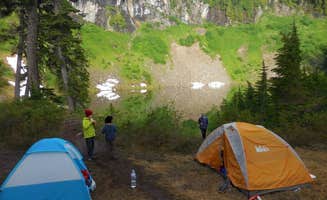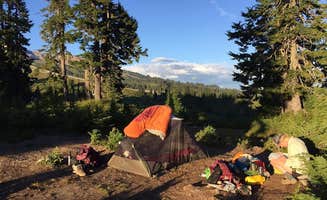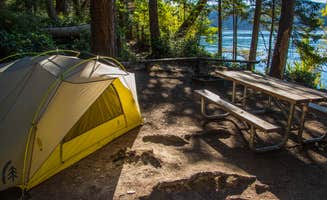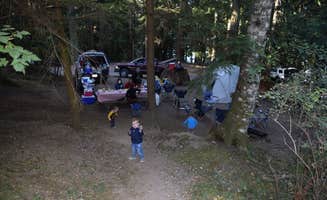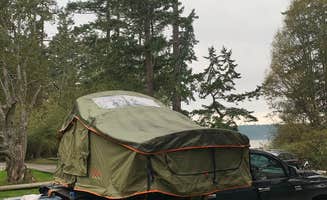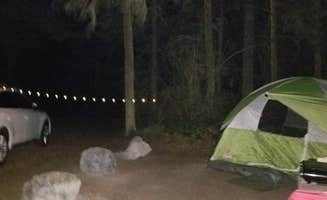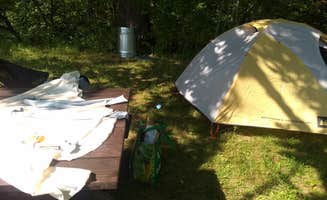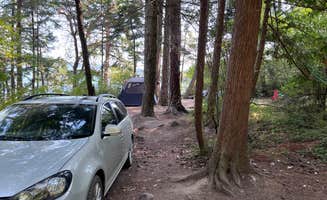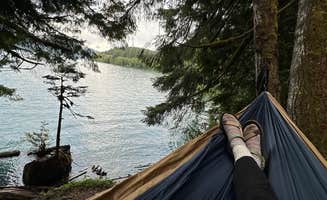Tent camping options near Sedro-Woolley range from dense forest settings to lakeside retreats at elevations between 200-1,500 feet. The region experiences mild summers with average temperatures of 65-75°F and receives 45-60 inches of annual rainfall. Winter camping remains accessible at lower elevations where snow accumulation rarely exceeds 4-6 inches.
What to do
Explore historic military installations: Fort Ebey State Park Campground offers access to World War II bunkers and concrete gun emplacements. "There are old (but well maintained) battery and concrete gun emplacements from WW2 when the Fort was used to defend the West coast," notes Margaret S. The park also features "hiking, paragliding, biking, and just watching the sound" according to Tom K.
Wade in shallow creek waters: Squire Creek Park & Campground provides a small beach area for water play. "Love playing the creek. Campsites are nicely spaced and private enough," reports Mindy P. The creek offers a gentle alternative to deeper lake swimming, making it suitable for families with young children.
Kayak mountain lakes: Mountain Lake Campground on Orcas Island features calm waters ideal for paddling. "It sits on Lake Moran which is a fun lake to kayak and cliff jump," says Rich M. Kayak rentals are available on-site during summer months, with prices around $20-30 per hour.
What campers like
Privacy between sites: Many campers appreciate the natural separation at locations like Cedar Groves Rural Campground with its "tent sites surrounded by tall dense trees." At Pine and Cedar Lakes Primitive Camping, Harry H. notes, "Campsites are all surrounded by dense forest and many have views of the little lake." The secluded nature of these sites allows for a more private camping experience.
Ease of first-time backpacking: Obstruction Pass State Park Campground offers an accessible introduction to backpacking. "My twelve year old wanted to try backpacking, but not hike too far. The solution? Obstruction Pass!" writes Don. "The hike is short, the campsites are good, and there is a pit toilet, unlike some other backpacking options."
Island wildlife viewing: Cypress Island Natural Resources Conservation Area provides unique wildlife observation opportunities. "You might even see some orcas swimming by," says Sarah C. Another camper, George, reports doing a "bioluminescence tour in the kayaks after midnight on the northern end of the island that was heart stopping."
What you should know
Fire restrictions vary by location: Fire policies differ significantly between campgrounds. At Cedar Lake Campsite, fires are prohibited entirely. Sean M. notes about Lily and Lizard Lakes, "All the sites had a fire ring, bench and a flat area to set up your tent."
Water sources require filtration: Most backcountry locations lack potable water. According to Sean M., "The only water source is from the lakes which is not the cleanest water so bring a good filter." Pack water treatment supplies for overnight stays at primitive sites.
Trail difficulty levels: Some tent sites require strenuous hiking. For Lily and Lizard Lakes, Audrey L. advises, "First half is steep and extremely busy but second half is quiet." The trail elevation gains can range from 800-1,200 feet depending on the destination.
Limited site availability: Many campgrounds have few available sites. "Only 4 campsites there and all really close to each other," Sean M. notes about Lizard Lake. Arrive early, especially for first-come, first-served locations.
Tips for camping with families
Start with shorter hikes: For families new to backpacking, choose accessible locations. Obstruction Pass offers "a hike [that] is fairly flat, with just moderate ups and downs," according to Don, who adds it has "a bunch of fallen trees that are fun to walk on."
Pack extra clothing layers: Temperature drops of 15-20°F commonly occur after sunset, even in summer months. Bring additional clothing for children who may be more sensitive to temperature changes.
Consider boat-in camping with kids: For a unique experience, boat access campgrounds offer different advantages. At Cypress Island, kayak-accessible sites provide educational opportunities with "incredible hikes" and chances to "view wildlife in quiet," according to Kelsey M.
Tips from RVers
Know your RV size limitations: Many campgrounds near Sedro-Woolley restrict larger vehicles. At Squire Creek, Patti C. advises: "If camping in a trailer, take special note of accessibility of the site by checking out the campground map. I would recommend the sites 1-11 area as most accessible for trailers."
Seasonal vacancy patterns: The best tent camping near Sedro-Woolley, Washington shows distinct seasonal patterns. Annie B. discovered Squire Creek was "not full on Labor Day weekend! I didn't know that existed." Winter and early spring generally offer greater availability at campgrounds that remain open year-round.
Road noise considerations: Traffic sounds affect some camping areas more than others. Suzanna L. reports at Squire Creek: "We had carefully selected our site to be away from the road but we were unsuccessful in escaping the sound." Consider mid-week stays when traffic volume decreases by approximately 30%.


